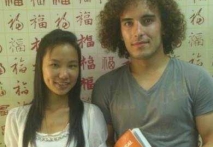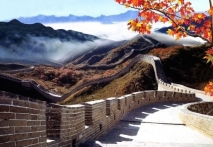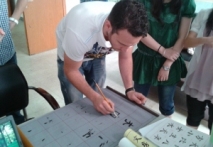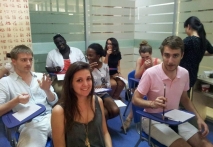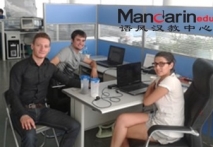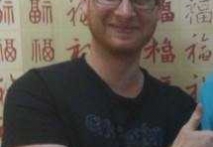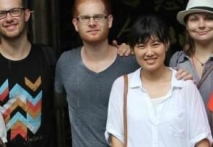Latest News
- Wuxi's Nanchang Street--a historic cultural district that combines classical charm, delicious food, and fun activities
- chinese study
- lastest courses
- Business Assistance/International Consortium of Stem Cell Research
- Foreigner's view of Jiangsu -Changzhou Jintan starts
- estimonials for Our new French Internship student Anais 企业表扬信
- The Double Seventh Festival in China Introduction
- Chinese Proficiency Test (HSK)
- China University Mining and Technology
- Wuxi Library
Students Say
Mandarin Student Zack
Mandarin Education School is a great place to learn Chinese and Chinese Culture.I've learned a lot in this school, my Chine...
Learn Chinese Travel China
If you want to learn Chinese and also discover China, Mandarin Education organize the most funny and cultural study tour.
The...
suzhou Mandarin Jude
I am Jude, I am learning Mandarin in Suzhou Mandarin School,I was learning in Wuxi Mandarin Education too.I like my Chinse Teacher...
chinese class
Improve your reading, speaking and your writing by experiencing our teaching methods,Offer free student Visa.
...
Wuxi Mandarin Jessie
I've learned Chinese for almost 8 years, I can understand what Chinese people say,but when I speak, I feel very uncomfor...
Chinese Internship or Jobs
You are looking for a professional experience abroad? Get the opportunity to discover the Chinese business,Look for an ...
Mandarinedu Student Florent
I love my Wuxi Mandarin Education School. It is the EASY MANDARIN Learning way, I am learning faster than I wanted.My teach...
Mandarin E Learning
Mandarin Education School offers you Online Chinese Courses. It has never been so easier to have Chinese courses ...
Mandarin Student Brad
I am studying Chinese in Mandarin Education School. I can speak quit good Chinese and talk to Chinese people by myself. Thank...
Wuxi Mandarin edu. Student Jennifer
I love learning Chinese in Mandarin Education School.That's a great place to learn and make friends.
...
Add Our School Official
to get more informations

0086 1866 1199 988
0086 510-81151808
Sandy.Swun
519988808
Mandarin Education School
Room 405, 4 Fl,Building No.8,
Maoye Business Center,
Chang jiang No.1,
New district , Wuxi City , China
Wuxi's History and future
As an ancient city, Wuxi has a long history of over 3500 years. There are a lot of historic sites to commemorate Taibo, including Taibo Temple (ruined after the Liberation) in Dalou Lane in the downtown area, Taibo Palace in Xishan District, Taibo Temple in Meicun, and Taibo Tomb Passage in Hongshan. There is a horizontal inscribed board with four Chinese Characters meaning “the most morale” hanging in the hall of Taibo Palace, and his contribution can be described as “Punished and exiled with different views, giving up the throne, and opening up an eternal Southern Yangtze River region”. Confucius once praised and said that “Taibo was a person with the most morality for giving up the throne and the people eulogized him voluntarily.” After 50 years of reign, King Wen of Zhou died and King Wu of Zhou succeeded to the throne, and destroyed the zhou Dynasty in B.C.1123, and conferred Anyang Hou on Zhouzhangshaozi,a descendant of Taibo. Therefore, the Mount Yang in the city of Xishan is also named as Mount Anyang.
In the 25th year of the reign of King Qin (B.C. 222), the state of Qin destroyed the state of Chu, and made Jijun the capital, with included Wuxi. In the 5th year of the reign of Gaozu of West Han Dynasty (B.C.202), Wuxi was officially planned to be rebuilt andnamed as Wuxi County. According to the archeological discovery, the handicraft industry in Wuxi had already included metallurgy, copper cast, pottery, and painting, iron farm tools and ox plough had been used in agricultural production. In the Spring and Autumn Period, the State of Wu developed greatly in the productivity, as well as in politics and military. In the 3rd year of the reign of King Zhouyuan(473 B.C.), the state of Yue destroyed the State of Wu, and Wuxi belonged to the state of Yue. In the 35th year of the reign of King Zhouxian(334 B.C.), The state of Chu destroyed the State of Yue, and Wuxi belonged to the State of Chu. In the 25th year of the reign of King Qin (222 B.C.), the State of Qin destroyed the State of Chu, and made Jijun the capital, with contained Wuxi. In the 5th year of Gaozu of West Han Dynasty (202 B.C.), Wuxi was officially planned to be rebuilt and named as Wuxi County. According to the archeological discovery, the handicraft industry in Wuxi had already included metallurgy, copper cast, pottery, and painting, iron farm tools and ox plough had been used in agricultural production. In the period of Six Dynasties, wars frequently happened in the north, so a lot of people moved to the south, harnessing the lake andbuilt dikes, building a lot of water conservancy facilities, and greatly improving the farming technique in Wuxi. Commercial trade began to form. In the Tang and Song Dynasties, the agricultural production in Wuxi developed from fire tillage water made fallow rotation to farming technique matched with plough, rake, and harrow, forming two-cooked rice and wheat system. The low-lying land around Taihu Lake was transformed into the irrigation and drainage network of waterways, and ponds. The sericulture was developed greatly, and was described as “Mulberries contain sparsely smoke; silkworm rearing trays are everywhere”in a poem. After the opening of Beijing-Hangzhou Grand Canal, the river course was full of “merchants caravans coming and going on ceaseless ships”. Workshops of gold and silver, colorful silks and alcohol and tobacco, oil and sauce, and rice were all opened in the city, forming brisk markets. Wuxi became a field of fortune in the prosperous regions south of the Yangtze River.
In the dynasties of Ming and Qing, the productivity of Wuxi developed fast due to advantageous natural conditions, convenient land and water communications, and relatively secure social environment. After dredged on large scales for several times, Furong Lake in the northwest of Wuxi formed a great area of fertile farmlands. In agriculture, intensive cultivation made the grain yield increase with years. “People can reap beans in spring, wheat in summer, rice in autumn, so they can reap a lot in the field in a year”. Wuxi became “the first region of rice stores” across China. With the thriving handcraft industry anddeveloping commodity economy, Wuxi gradually became famous rice market and cloth wharf in the regions south of Yangtze River.
Rice market: As far back as Yuan Dynasty, Wuxi had been the cluster of rice tribute of the neighborhood counties. In Ming Dynasty, with the promotion of intensity water conservancy project and the technique of transplanting rice seedlings, Wuxi had steady grain output, and the rice of Wuxi was compared with silk of Suzhou and Hangzhou, salt of Yangzhou, china of Fuliang, and paint of Wenzhou. In the early Qing Dynasty, the distribution of rice in Wuxi not only ranked first among the counties in Jiangsu Province in operation scale and trade quantity, but also became the main purchase place and surplus and deficiency adjusting market described as “the producers transport it and the purchasers collect it”. During the reigns of emperors Yongzheng and Qianlong, the rice market of Wuxi began to take shape, described as “The business of rice and beans ranked first in Jiangsu province” and “Lots of rice merchants from provinces of Anhui, Henan, and Zhejiang came here by ship”.
Cloth wharf: With the forming and developing of Wuxi’s rice market, the cotton of the northern area, especially in the cotton production regions like Huaiyang and Gaobao Lake in northern Jiangsu was shipped by rice purchasers to Wuxi, thus forming thriving textile industry in the countryside of Wuxi. As a result, although no cotton was planted in Wuxi, almost all families in the countryside had looms to weave cotton cloth. During the reign of Emperor Hongzhi in Ming Dynasty, the cloth market was formed with lots of cloth shops to the south of Lianrong Bridge outside the north Gate of Wuxi. “Merchants buy the cloth, ship it, and sell it in regions like Yangzhou and Gaobao. Millions of bolts of cloth are traded in a year”. During the late Ming and early Qing periods, the cloth wharf once declined. In the middle of Qing Dynasty, the family textile industry in Wuxi thrived again, andthere were 40,000 to 50,000 wooden looms in the whole county, with the annual production of three million bolts, which accounted for 6.7% of the cotton cloth production of the whole country. Cloth merchants across the country all gathered in Wuxi, forming miles of cloth markets from Beizhakou to Beitang. In the reign of Emperor Qianlong, from seven million to ten million bolts of cloth were traded in Wuxi in a year. Wuxi was entitled as “Cloth wharf”, with the other two wharfs-“ship wharf” in Haikou, and “Money wharf” in Zhenjiang, forming the three wharfs along Yangtze River.
During the republican period, the number of industrial workers in Wuxi ranked 2nd in the whole country, just next to Shanghai, where the industry was controlled by people from Wuxi. It was said in Shanghai that the industry and commerce was controlled by people from Wuxi, while the financial industry was controlled by people from Ningbo.
>The present and future period is a period of important strategic opportunities of our country, and Wuxi is faced with rare historic opportunities for development. With the thorough development of the multi-polarization of the world and the globalization of the economy, a new revolution of science and technology and industry has emerged. The green and low-carbon concept has become new development trends, and the global economy will enter a period featured by structure transformation and fierce competition and so on. Our country has entered a crucial stage of building a moderately prosperous society in all aspects.The industrialization, informatization, urbanization, marketization, internationalization develop thoroughly, the basic situation of long-term good development hasn’t changed, and accelerating the transformation of the economic growth form become a profound revolution in the field of economic society. With the implementation of the regional planning of Yangtze River Delta, and development planning of coastal areas of Jiangsu Province, and the establishment of Beijing-Shanghai High Speed Railway, Shanghai-Nanjing and Nanjing-Hangzhou Intercity High Speed Railway, the integration process of the Yangtze River Delta has been accelerated, and the regional industrial layout, social structure, city functions, andthe lifestyle of the residents will change thoroughly. Meanwhile, the great influence of the international financial crisis, the slow-down of the world economic growth, and the emergence of various forms of protectionism, more fierce regional competition in China, especially in the talents and science and technology have made the environment for the development of Wuxi become more complex and uncertain. The overall developing environment, conditions, and motive power of Wuxi have been changing profoundly, and the economic society has entered a new historic stage of development stimulated only by accelerated adjustment.
The next five years will be a crucial period of accelerating the transformative development. Accelerating the transformative development is the inevitable requirement to promote the scientific development and take the lead in developing, and a strategic task for Wuxi to transform from a big economic city into a strong economic city, and must run through the whole process and all the fields of the development of the economic society. We must accelerate the transformation from resource consumption drive into innovation drive, from extensive growth into intensive form of development, from the dual structure into integration of country and city, further improve the comprehensiveness, harmony and sustainability of the development.
The next five years will be a critical period of building ecological civilization. Promoting the strategic transformation from industrial civilization into ecological civilization, is the great historic task of the new development period of Wuxi. We must make the construction of resource-saving, environment friendly society the strength point, deeply implement the policy of saving andenvironmental protection, develop circular economy, extend low-carbon technology, construct ecological civilization development system, promote the coordination of the development of economic society and the population resource environment, and realize sustainable development.
The next five years will be a promotion period of developing the people’s welfare. Guaranteeing and improving the people’s life are the starting points and objectives of accelerating the transformative development. We must highlight “Being stronger by being rich, and benefitting the people” in the development of the Twelfth Five-year Plan, complete the institutional arrangement of guaranteeing and improving the people’s life, promote the equalization of basic public services, and make great efforts to extend the achievements in developing the people’s living standard, satisfying the people’s material and cultural needs, boosting the people’s integrated development, and promoting the transformation from a big economic city into a strong andrich city.
The next five years will be a decisive period of the construction of basic modernization. Wuxi’s accelerating the achievement of the target is the central and provincial governments’ ardent expectations for Wuxi. We must make “taking the lead in promoting the development of science and building pioneering Wuxi and happy Wuxi” the development theme of the Twelfth Five-year Plan period, persist in the basic requirements of “development is the absolute principle and the first business”, stick to scientific and first development, and work hard to enter the new development stage of basic modernization first both in Jiangsu Province and in China.




